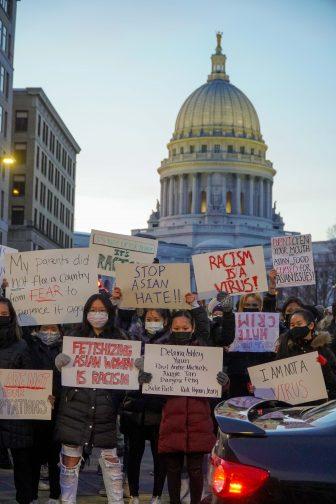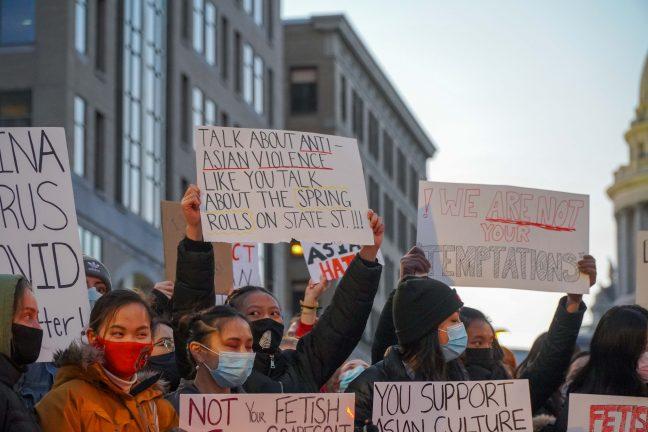Several University of Wisconsin organizations arranged events for individuals to process or speak on the March 16 Atlanta shootings which killed eight individuals, six of whom were members of the Asian Pacific Islander Desi American community.
Two days after the shootings, UW’s BIPOC Coalition held an Asian Lives Matter protest in which students and community members stood in solidarity with the APIDA community. Hundreds of demonstrators protested and several discussed their personal experiences with Asian hate. UW student Tarah Stangler, one of the protest organizers, said a goal of the event was to provide a microphone to the APIDA community.

Ahmad Hamid/The Badger Herald
“It was a way to give a platform to a group of people, specifically APIDA people, who don’t always have the platform to be heard,” Stangler said.
The March for Asian Lives was not the only event university organizations held for the APIDA community on campus. The Division of Diversity, Equity & Educational Experience hosts monthly affinity group sessions as a safe space for anyone wishing to discuss sensitive topics. In a statement published by UW regarding the Atlanta shootings, members of the APIDA community are encouraged to attend a DDEEA event April 8.
DDEEA Director of Communications Mary Carr Lee said UW began hosting meetings in 2019 with the intention of helping marginalized and underrepresented members of UW build a community and make connections.
“These gatherings are part of the Diversity Framework and a direct response to feedback from campus community members that faculty and staff — particularly newer ones — sometimes find it difficult to meet and make connections with people who share their backgrounds and identities on UW-Madison’s sprawling, predominantly white campus,” Carr Lee said.
The APIDA Student Center, Multicultural Student Center, Student Affairs and UHS-Mental Health Services also held a Zoom meeting for Asian and APIDA-identified students March 19 to “discuss the recent and increasing violence towards the Asian and APIDA communities,” according to a Student Affairs statement.
Negative stereotyping of Asians grew more prevalent in the U.S. after the onset of the COVID-19 pandemic. An analysis for the Center for the Study of Hate at California State University-San Bernardino revealed a spike in anti-Asian hate crimes in March and April 2020 with Asian hate crimes rising nearly 150%, while overall hate crimes decreased by 7% in this same time period.

UW’s statement regarding the shooting in Atlanta acknowledged the increase of anti-Asian crimes and detailed how anti-Asian sentiments stem from a long history of violence towards Asians in the U.S.
UW student Meun Wang was unimpressed, and said she did not feel UW’s statement adequately addressed the issue at hand.
“Some of the statements [UW] released were tone-deaf at best and just didn’t really cover what I hoped the university would cover,” Wang said.
Inaugural Mental Health & Wellbeing Summit, week of care seeks to boost students’ mental health
Stangler agreed with this sentiment, saying that UW’s statement did not explain America’s history of Asian hate in detail, and instead only briefly mentioned its existence. Stangler said the statement also did not recognize the anti-Asian rhetoric seen on the UW campus in the past, and only acknowledged national anti-Asian messaging.
Last March, racist statements mirroring claims by former President Donald Trump regarding China and COVID-19 were written across UW campus.
UW student Lisa Yang said UW’s statement frustrated her, and in her view, the mental health resources referenced by the statement seemed to act as a pop-up in times of crisis, rather than consistent mental health resources for marginalized and underrepresented members of the UW campus.
“I think it’s really messed up that [UW] keeps doing these crisis pop-ups for mental health when they can systematically really invest in therapists for our communities,” Yang said.
BIPOC community of Madison less likely to get mental health support despite higher COVID-19 rates
Yang said she supports the current mental health resources in place for APIDA individuals on campus, but believes their existence should be continuously funded.
Stangler said she believes UW should a take a more dynamic role in helping students of color feel welcome.
“For APIDA students on campus, I hope they know that they’re loved, and they’re supported and that there are people ready to listen to what they have to say and to fight for changes to be made so they can feel welcome and feel like they belong on this campus,” Stangler said.


